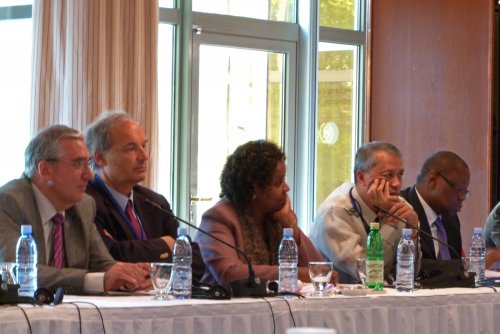They Say
10 May, 2012
What can Georgia learn from African conflicts?
A series of discussion was held in Tbilisi on Tuesday to review conflict problems in Georgia. Comparisons were made between “good” and “bad” conflict case studies in various African countries with those in Georgia.
The main topic of discussion was effective ways that conflicts could be resolved, including alternative conflict resolution models. Representatives of various non-governmental organizations working on conflict issues took part.
Guests from foreign countries represented different models of solving conflicts in different countries. The forum was held under the auspices of Global Partnership for Prevention of Armed Conflict (GPPAC), which organized the meeting. The event was supported by Dutch Ministry of Foreign Affairs and Swiss Federal Department of Foreign Affairs.
Among the guests there were GPPAC West Africa’s Regional Representative, GPPAC honorary chair, GPPAC’s Southeast Asia regional and Eastern and Central Africa’s regional representatives. A number of foreign guests from international organizations and local media representative also attended.
Emmanuel Bombande, GPPAC chair and West Africa Regional Representative, also Executive Director of the West Africa Network for Peace building opened the discussion and noted that “conflicts are more common between states at this time than previously.”
One of the main problems, according to Emmanuel Bombande, is ways to develop consensus between parties – government and society, making it easier for people to gain access to different sources and how such resources are distributed; this included ways that power is distributed in conflict resolution.
In Africa, he says, “there are some governments where only one person, the president, is deciding how to spend state money, how to distribute powers, which naturally causes dissatisfaction and results in various conflicts.”
Emmanuel went on to suggests ways of building state institutions, which are impartial in terms of their relations with government, and now it is essential to speak with people who are actual parties to the conflict.
Often international organizations become actively involved in solving conflicts in the regions, albeit then countries start turning to such organizations to take the lead. Based on actual experience in the sphere of conflict studies, he says “it won’t solve the conflict; those people come from outside; their help is important but it is crucial for people in the conflict and government to get involved in the process. They need not depend on foreign hands as outsiders may not understand the problems.
Regardless, he adds, “It’s possible to prevent violence, but you have to wait. Even when one has access to power, that access should be observed, as power gets distributed on a daily basis and that needs time to complete.”
Paul Van Tongeren, GPPAC Honorary Chair says that often, governments lack good structures that are able to deal with conflicts; they are not well-organized, while often they may have effective structures in education, health-care or other fields.



